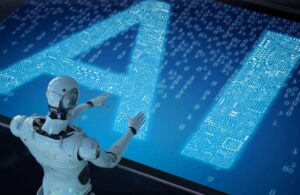AI in Manufacturing: Revolutionising Production Efficiency
In the rapidly changing world of manufacturing, AI has transformed efficiency, innovation, and precision.
AI helps companies optimise operations, enhance product design, and improve quality control. This makes processes faster and more reliable.
Many manufacturers are now embracing AI technologies to stay competitive and meet market demands.
Today, AI is not just about automation; it’s reshaping how humans and machines work together on the factory floor.
This collaboration leads to better utilisation of data, enabling smarter decisions and fostering innovation at unprecedented levels.
As supply chains become more complex, AI supports demand forecasting and supply chain optimisation, addressing critical business challenges.
The integration of AI in manufacturing also prioritises safety and security, ensuring that new technologies empower the workforce rather than replace it.
This shift requires ongoing talent development and transformational strategies, preparing workers for the evolving roles AI brings into the industry.
Key Takeaways
- AI boosts manufacturing efficiency and quality.
- Collaboration between humans and AI enhances data use.
- Workforce transformation is key for AI adoption.
The Role of AI in Manufacturing
AI is reshaping the manufacturing industry by increasing efficiency, enhancing productivity, and driving innovation. It leverages advanced technologies to optimise processes, reduce waste, and improve product quality.
Revolutionising the Manufacturing Sector
AI is significantly transforming manufacturing by automating routine tasks, which boosts productivity.
Machines can analyse large data sets faster than humans, identifying patterns and predicting equipment failures. This predictive maintenance reduces downtime and costly repairs.
Additionally, AI enables customisation in manufacturing. By analysing consumer data, manufacturers can tailor products to specific needs, enhancing customer satisfaction and loyalty.
Furthermore, AI improves supply chain management by predicting demand and adjusting production schedules. This optimisation reduces excess inventory, lowering costs and improving cash flow.
Key AI Technologies and Their Functions
Several AI technologies are driving changes in manufacturing.
Machine learning allows systems to learn from data and improve over time without explicit programming. It is used for quality control, analysing product defects, and enhancing production processes.
Robotics and automation streamline operations by handling repetitive tasks with precision and speed.
Generative AI assists in design phases, creating prototypes based on specifications, which accelerates development cycles.
Digital twins, virtual representations of physical systems, enable simulations of manufacturing processes. These simulations help identify inefficiencies and test modifications without disrupting actual operations.
AI Adoption in the Manufacturing Operations
Many manufacturers are experimenting with AI, with a growing number adopting these technologies at scale.
Successful AI adoption often hinges on aligning AI strategies with business goals.
Training and upskilling workers are crucial as AI transforms job roles, moving human workers from manual tasks to supervising automated processes.
Early AI adopters typically focus on areas like predictive maintenance and quality control. These applications provide measurable returns on investment, encouraging further AI implementation.
Additionally, embracing AI requires an infrastructure capable of handling vast amounts of data.
Companies are investing in cloud solutions and IoT (Internet of Things) devices to collect and process information seamlessly, propelling AI initiatives forward.
Enhancing Manufacturing Through Data Utilisation
Utilising data in manufacturing can drive efficiency, cut costs, and improve product quality.
Importance of Data Foundations
A strong data foundation is key to any manufacturing operation. It begins with collecting accurate and relevant data from various sources like machines, sensors, and production lines. This data helps in creating a clear picture of the entire manufacturing process.
Data needs to be organised and stored systematically. Using databases and cloud technologies can enhance access and manageability.
Good data governance, including clear policies and standards, ensures consistent and reliable data use. This foundation supports advanced analytics and decision-making processes.
Maximising Data Quality and Analytics
High data quality is essential for reliable analytics.
Clean, consistent, and comprehensive data ensures that analytics can deliver accurate insights. Manufacturers need to implement data cleansing methods to eliminate errors and discrepancies.
Advanced analytics tools can process vast amounts of data, identifying trends that may not be visible otherwise.
By employing machine learning algorithms, manufacturers can turn raw data into actionable insights. These insights allow for optimising production processes and improving overall efficiency.
Leveraging Data for Predictive Maintenance
Predictive maintenance uses data to foresee equipment failures before they happen.
By gathering data from machines and performing regular analyses, manufacturers can predict and prevent breakdowns, reducing downtime and repair costs.
Sensors collect real-time data on machinery condition, feeding into analytical models that identify potential issues.
This approach helps schedule maintenance activities based on actual need rather than routine schedules. As a result, equipment lifespan is extended, and operational efficiency is enhanced.
Optimisation of Supply Chain and Demand Forecasting
Artificial intelligence is reshaping supply chain operations by boosting efficiency and accuracy in demand forecasting.
This optimisation means businesses can manage resources better and respond swiftly to market changes.
Advancing Supply Chain Management with AI
AI helps to streamline various aspects of supply chains, enhancing their effectiveness. It plays a crucial role in inventory management, reducing waste by assessing optimal stock levels. Also, AI improves supply chain agility, enabling swift adaptations to unexpected disruptions.
Risk management benefits greatly as AI analyses patterns and predicts potential pitfalls. By doing this, manufacturers can alleviate vulnerabilities and bolster resilience.
Moreover, AI promotes supply chain transparency, helping businesses gain insights into every aspect of the process for informed decision-making.
Integrating AI for Accurate Demand Forecasts
AI-driven demand forecasting uses algorithms to predict consumer needs with impressive precision. This helps companies plan production schedules and inventory levels efficiently. As a result, they can minimise stockouts and excess inventory.
Machine learning algorithms analyse historical sales data to identify trends, seasonality, and external factors affecting demand. This leads to forecasts that adapt to changing conditions.
Enhanced forecasting allows manufacturers to align their operations closely with demand, improving operational efficiency.
By integrating AI, businesses gain a competitive edge through better resource allocation and reduced operational costs.
This technology ensures that products meet demand promptly, enhancing customer satisfaction and loyalty.
AI-Driven Process Optimisation and Efficiency
AI technologies are transforming manufacturing by improving process efficiency and reducing costs. With smart automation, manufacturers can streamline operations and enhance production times, leading to significant cost savings.
AI Capabilities for Process Automation
AI brings extensive capabilities for automating processes in manufacturing.
Machine learning algorithms can analyse vast amounts of data to identify patterns and optimise assembly lines. This data-driven approach enables real-time process adjustments, minimising human errors and improving product quality.
AI applications like predictive maintenance ensure that machinery operates reliably by anticipating and addressing potential failures before they occur.
Automation of routine tasks also allows workers to focus on more complex activities, thereby increasing operational efficiency.
Enhancing Production Times and Cost Savings
By optimising production processes, AI considerably shortens production times. It allows for swift adaptation to changes in demand, ensuring capacity is utilised efficiently. With AI’s precision, waste is minimised, leading to cost-effective resource allocation.
The ability to predict demand accurately also helps in managing inventory levels, thus reducing storage costs. Moreover, AI-driven simulations can predict outcomes of various manufacturing scenarios, enabling informed decision-making that maximises cost efficiency.
Through enhanced efficiency and optimised processes, AI ensures that production is faster and more economically sustainable.
Advancements in Product Design and Development
The use of AI in manufacturing has reshaped product design and development. With technologies like Generative AI, companies are creating innovative designs and exploring new development possibilities.
Incorporating Generative AI for Design Innovation
Generative AI plays a key role in transforming product design by offering tools that push the boundaries of creativity.
Designers use Generative AI to explore multiple design variations quickly, which leads to enhanced creativity and efficiency.
This technology allows for rapid prototyping, as AI can suggest materials, forms, and structures that might not be immediately obvious to human designers. AI-driven design software can evaluate and enhance designs for optimal performance, reducing the development cycle.
Manufacturers benefit from this by being able to customise products to meet diverse market demands, ensuring products are not only innovative but also functional. Generative AI can simulate countless scenarios to determine the most effective solutions to complex design challenges.
AI and the New Horizons in Product Development
AI facilitates new horizons in product development by improving research and workflow efficiency.
Machine learning algorithms predict trends and consumer needs, allowing companies to tailor their products accordingly. This foresight is vital in staying ahead in competitive markets.
AI assists engineers in understanding material behaviours and testing products virtually, dramatically reducing the physical testing phase. This ensures a quicker time to market while maintaining high quality standards.
AI technologies enhance collaboration across teams, aligning product vision with technical feasibility. By integrating AI into product development, companies can foster an environment of continuous innovation, ensuring their offerings remain relevant and competitive in the evolving manufacturing landscape.
Quality Control and Maintenance in AI Practices
In manufacturing, AI plays a crucial role in elevating quality control and enabling predictive maintenance. By leveraging AI, manufacturers can detect defects early and optimise maintenance schedules, saving time and resources.
Implementing AI for Superior Quality Control
AI enhances quality control by using technologies like computer vision to inspect products.
Visual Inspection AI, for example, automates the detection of product defects. Manufacturers gain the ability to identify anomalies much earlier compared to traditional methods.
These systems use AI algorithms to learn from historical data, spotting patterns that indicate potential quality issues.
Real-time data analysis allows for swift actions, reducing waste and improving overall product reliability. Key tools include deep learning models that become more accurate over time.
Manufacturers benefit from reduced errors, faster inspection processes, and an overall boost in product quality.
By developing a systematic approach to integrating AI, companies can transform their inspection workflows efficiently.
AI Strategies for Predictive Maintenance
AI significantly optimises maintenance practices through predictive maintenance, which involves forecasting equipment failures before they occur.
This strategy relies on analysing condition data and identifying signs of potential breakdowns.
By implementing machine learning models, companies can predict when machines might need repairs. This leads to minimal downtime and extends equipment life.
Historical and real-time data inform these predictions, making them accurate and actionable.
Predictive maintenance supports a proactive approach to machine care, enabling timely interventions that prevent costly repairs. Manufacturers can schedule maintenance during low-impact periods, ensuring continuous operations and maximising productivity. Emphasising data quality ensures that predictive models remain effective and reliable over time.
Prioritising Safety and Security with AI
AI is reshaping how safety and security are managed in manufacturing. By incorporating advanced technologies, it reduces accidents and enhances cybersecurity. These innovations focus on safeguarding both workers and sensitive data.
AI Contributions to Workplace Safety
AI plays a crucial role in boosting workplace safety.
Visual AI systems monitor manufacturing lines to detect potential hazards such as machine malfunctions or unsafe worker movements. These systems allow for quick interventions that can prevent accidents before they happen, significantly reducing the risk of injuries.
AI also helps in reinforcing safety protocols by automating routine checks. Robots equipped with sensors can perform inspections of machinery, ensuring safety standards are consistently maintained. This not only keeps employees safe but also enhances productivity by minimising downtime.
Moreover, AI can predict safety issues by analysing data trends. It identifies patterns in equipment failure, allowing preemptive measures to be put in place. This proactive approach reduces the chance of unexpected events that could compromise safety.
Managing Cybersecurity through AI Innovations
AI solutions are increasingly used to strengthen cybersecurity in manufacturing. They monitor network traffic in real time for unusual activities.
Machine learning algorithms help identify potential threats like unauthorised access or malware by recognising patterns that deviate from normal operations.
AI also automates responses to detected threats, acting swiftly to contain security breaches. This includes isolating affected systems to prevent the spread of harmful attacks. Such responsiveness is vital in protecting sensitive manufacturing data and ensuring operational security.
Another benefit of AI is its ability to learn from past cybersecurity incidents. By analysing these events, AI systems continually improve their threat detection and response strategies.
This adaptability ensures manufacturing facilities remain secure against evolving cyber threats.
Workforce Transformation and Talent Development
AI technologies are reshaping the manufacturing industry by demanding new skills and transforming roles. The workforce must adapt through reskilling and embracing emerging AI capabilities to stay competitive in this rapidly changing environment.
Reskilling the Workforce for the AI Era
Manufacturing workers are increasingly required to work alongside AI systems. This requires training programmes that focus on new technical skills and the integration of AI technologies.
Reskilling initiatives help workers develop competencies in data analysis, machine learning (ML), and AI system maintenance.
Training can be achieved through online courses, workshops, and partnerships with educational institutions. Companies may invest in on-the-job training to provide practical experience.
Additionally, a mindset shift towards continuous learning and adaptation is crucial to navigate the evolving landscape.
Emerging Skills for the AI-Enabled Manufacturing Industry
With AI, new skills are becoming critical for manufacturing professionals. Knowledge in machine learning algorithms, data management, and AI ethics are growing in importance.
Workers must understand how to interact with AI tools and interpret data insights effectively.
Soft skills like critical thinking and problem-solving are increasingly valued as automation handles routine tasks. These abilities enable workers to make informed decisions and adapt to AI-augmented workflows.
Collaboration and adaptability also play a key role in fostering innovation in AI-enabled environments.
Developing these skills ensures the workforce can leverage AI capabilities to enhance productivity and drive industry innovation.
Smart Manufacturing and Robotics
Smart manufacturing is evolving rapidly, with robotics at its core. The integration of intelligent systems and human collaboration is transforming production lines to be more efficient and adaptive.
Rise of Cobots in Modern Manufacturing
Collaborative robots, or cobots, are redefining factory environments. Unlike traditional robots, cobots work alongside human operators, enhancing safety and boosting productivity.
They are designed to handle repetitive tasks such as assembly, packaging, and quality checks, thereby reducing error rates.
Cobots are equipped with sensors and machine learning capabilities, allowing them to adapt to changing tasks. Their flexibility makes them ideal for small and medium-sized enterprises seeking cost-effective automation solutions.
This technology contributes to a safer workspace while maximising operational efficiency.
Robotics and AI Integration in Production Processes
Artificial intelligence enhances robotic systems by providing real-time data analysis and decision-making capabilities.
Intelligent robots can monitor and optimise production processes, predict maintenance needs, and identify defects early. This level of integration ensures smoother operations and reduced downtime.
AI-driven robotics enable mass customisation, allowing manufacturers to switch between product models effortlessly. Automated guided vehicles (AGVs) and autonomous mobile robots (AMRs) assist in logistics and material handling within smart factories.
This synergy of AI and robotics is pivotal in achieving continuous improvement and innovation in manufacturing environments.
Innovative AI Tools and Applications
In the manufacturing industry, AI is creating significant advancements. The tools like Digital Twin technology, Computer Vision, and simulation-driven content creation are reshaping processes, enhancing productivity, and driving efficiency.
The Digital Twin Technology
Digital Twin technology is revolutionising manufacturing. It creates a virtual replica of physical objects or systems. These digital models allow manufacturers to simulate, predict, and optimise performance without physical interference.
They offer real-time data analysis by mirroring the system’s operations. This helps identify potential issues before they arise, leading to improved maintenance schedules and cost savings.
By using Digital Twins, manufacturers can enhance product development, assure quality, and boost overall production efficiency.
Computer Vision and Its Manufacturing Applications
Computer Vision is a powerful AI tool that analyses images and videos to extract meaningful information. In manufacturing, it’s used for quality control and defect detection.
By automating inspection processes, it identifies deviations from quality standards quickly and accurately.
This technology allows for continuous monitoring of production lines, improving efficiency and reducing waste. It also helps in implementing safety measures and optimising supply chain processes through real-time data analysis.
Simulation and AI-Powered Content Creation
Simulation in manufacturing involves using AI to create realistic virtual models. This technology tests different scenarios to optimise workflows and processes.
AI-driven simulations allow for risk-free experimentation with production techniques and resource management.
Additionally, AI-powered content creation is gaining traction in product design and marketing. It enables rapid prototyping and comprehensive project visualisation.
This, in turn, reduces development time, enhances innovation, and provides better insights into consumer preferences and product fit.
Regulatory Framework and Compliance
AI in manufacturing requires adherence to specific regulations and standards to ensure products meet safety and quality requirements. Companies must navigate these frameworks to implement AI responsibly and take advantage of digital transformation opportunities.
Navigating Regulatory Compliance in AI Applications
Regulatory compliance is crucial in AI products and applications for manufacturing. Standards like those from ISO (International Organization for Standardization) guide compliance efforts, ensuring processes and products meet legal and safety standards.
Manufacturers must also consider industry-specific regulations, like those from the FDA in drug manufacturing.
Understanding these regulations enables businesses to implement AI technologies without legal hindrances. Regular audits and compliance checks can help manufacturers keep up with evolving laws.
Hiring specialists familiar with AI regulations can further support companies in maintaining compliance as they incorporate AI into their operations.
Standards for Interoperability and Digital Transformation
Interoperability refers to the ability of different AI systems to work together seamlessly. In the manufacturing sector, this is essential for efficient operations and digital transformation.
Standards promoting interoperability help manufacturers integrate AI systems across various platforms.
Global digital economy demands adherence to international standards, ensuring systems communicate and function correctly.
Frameworks promoting interoperability such as those suggested by ISO31000 can aid in achieving this goal.
Embracing these standards can facilitate smoother transitions to advanced digital manufacturing methods, optimising productivity and innovation in the sector.
Market Trends and the Future of AI in Manufacturing
AI is becoming a critical part of the manufacturing industry. Its integration is driving significant changes, from enhanced production processes to the emergence of smart factories. This section explores various trends, revolutionary impacts, and influential networks shaping the future of AI in manufacturing.
Analysing Current Market Trends
In recent years, the use of artificial intelligence in manufacturing has surged. The market was valued at USD 4.10 billion in 2023 and is projected to grow rapidly.
AI technologies are being applied to improve efficiency and productivity in manufacturing settings.
Key developments in this market include predictive maintenance, which can save up to 40% of repair costs. Many companies report enhanced production processes, with increased efficiency and cost-effectiveness.
Around 64% of manufacturing firms are researching AI, and 35% have already implemented AI solutions.
Preparing for the Fourth Industrial Revolution (4IR)
The Fourth Industrial Revolution (4IR) brings digital transformation and advanced technologies. AI plays a crucial role in this shift, automating complex processes and enabling smart manufacturing.
Robotics powered by AI is becoming more versatile and responsive, helping manufacturers stay competitive.
AI integration allows for flexible production lines and real-time data analysis. These capabilities enable manufacturers to adapt quickly to market changes.
The synergy between AI and other 4IR technologies, like the Internet of Things, provides unprecedented control and efficiency in production.
The Global Lighthouse Network and Advanced Manufacturing
The Global Lighthouse Network is a group of manufacturers known for their advanced technology adoption. These companies lead the way in utilising AI to transform manufacturing.
They exemplify how strategic use of AI can boost efficiency and innovation.
AI in this network has led to streamlined processes and improved decision-making. Manufacturers use AI for precise demand forecasting and inventory control, creating more agile and resilient supply chains.
The insights gained enable these companies to develop advanced manufacturing practices, setting industry standards.
This focus on AI in manufacturing indicates a continued evolution towards more intelligent and dynamic industrial operations.
Frequently Asked Questions
Artificial intelligence is reshaping the manufacturing landscape in significant ways. These changes include increased efficiency, enhanced product design, and improved maintenance strategies. Here are some common questions regarding AI’s role in manufacturing.
What are typical applications of AI in the manufacturing sector?
AI is often used in manufacturing for product development, quality assurance, and predictive maintenance. Companies use AI to optimise production processes and improve the accuracy of quality control measures.
This technology also helps in automating routine tasks to enhance overall efficiency.
How has the integration of AI transformed productivity and efficiency in manufacturing industries?
The integration of AI enhances productivity by automating complex tasks and analysing large datasets. This results in shorter production times and reduced waste.
Manufacturers achieve higher efficiency by using AI to monitor performance and make real-time adjustments to the production line.
What are the key factors driving the adoption of AI technology in manufacturing?
Key factors include the need to remain competitive, the demand for higher efficiency, and the increasing availability of AI technologies.
Companies are investing in AI to meet market demands and leverage data insights for better decision-making and operational excellence.
How do AI-powered predictive maintenance systems benefit manufacturing operations?
Predictive maintenance systems use AI to anticipate equipment failures before they occur. This allows manufacturers to schedule maintenance at optimal times, reducing downtime and repair costs.
As a result, the longevity and reliability of manufacturing equipment improve significantly.
In what ways has generative AI impacted the product design process within manufacturing?
Generative AI has revolutionised product design by allowing designers to create innovative solutions quickly.
It helps in generating efficient design alternatives and optimising them for performance and cost. This leads to more creative and functional products that meet specific needs.
What is the expected growth trajectory for the AI in the manufacturing market over the next decade?
The AI in the manufacturing market is expected to grow substantially over the next decade. Advancements in technology and increasing adoption by manufacturers drive this growth.
The market is poised for continuous expansion as AI becomes a more integral part of manufacturing operations.





















